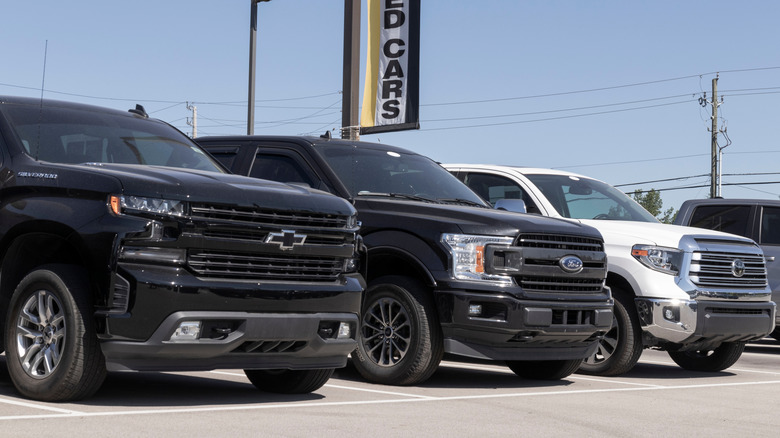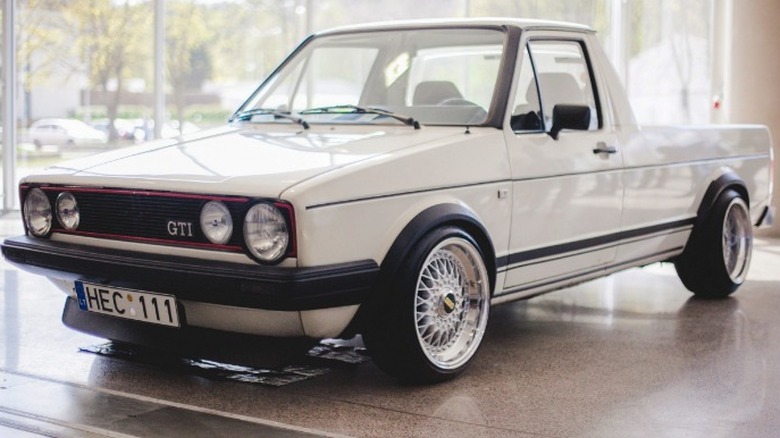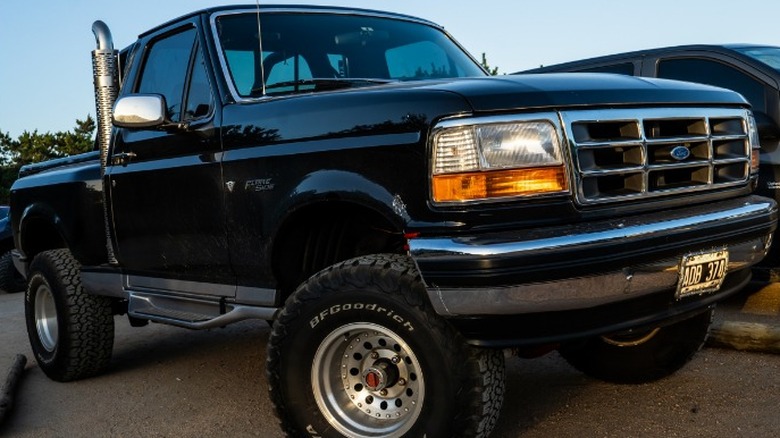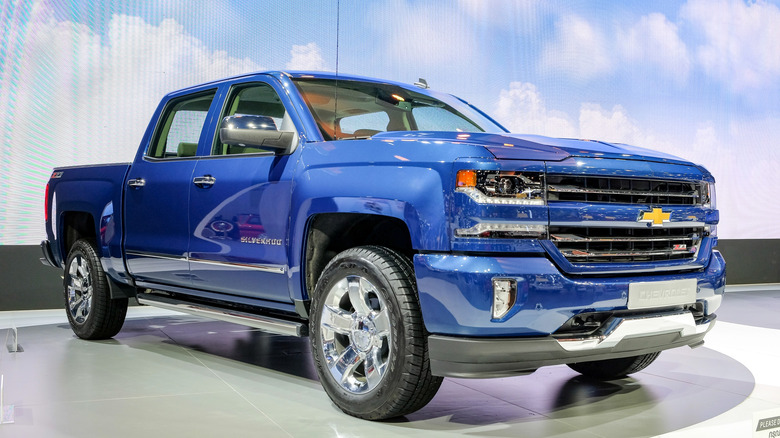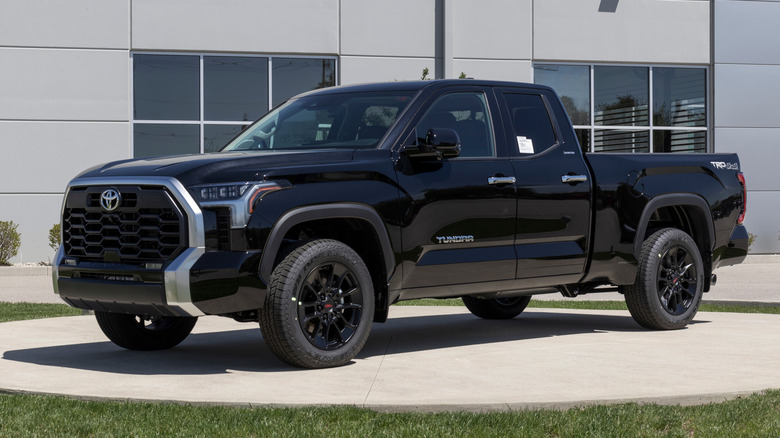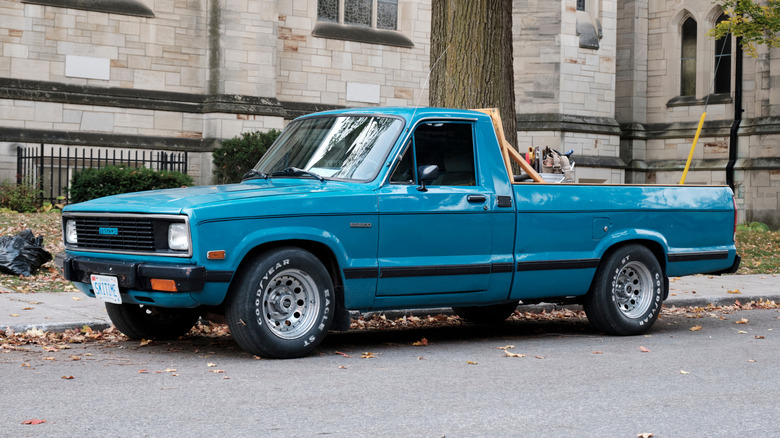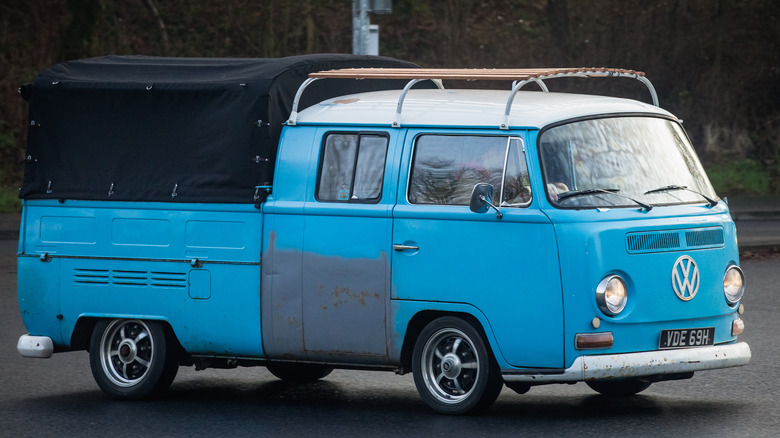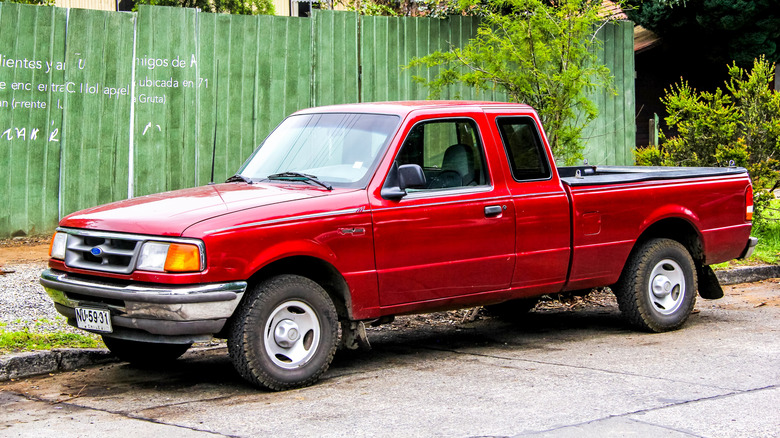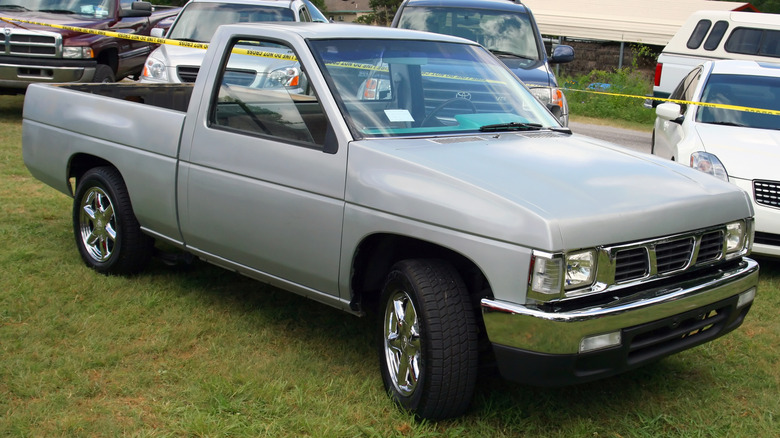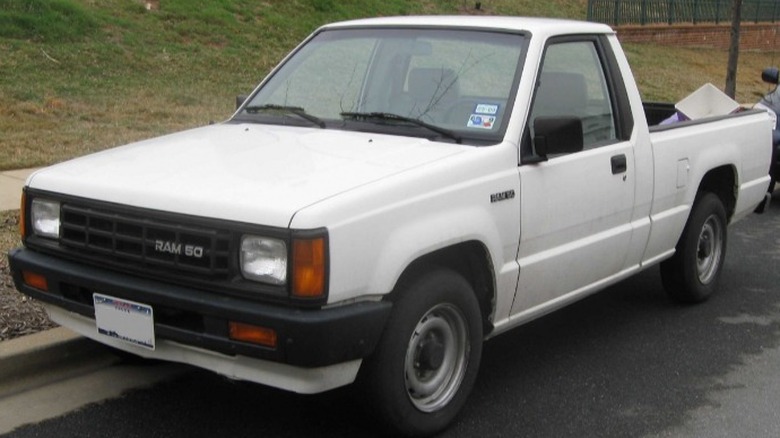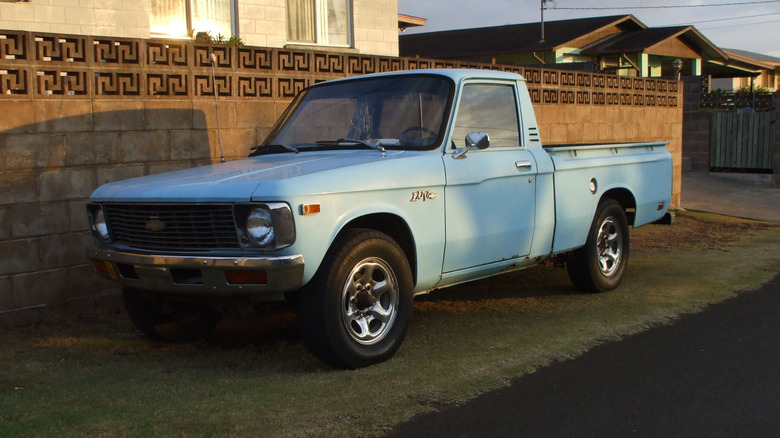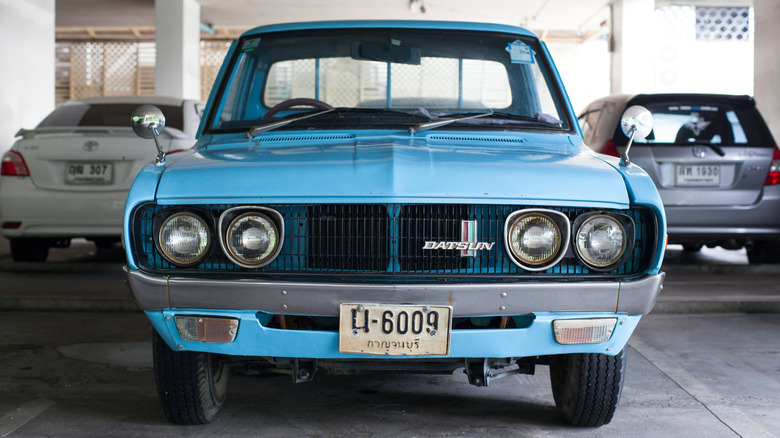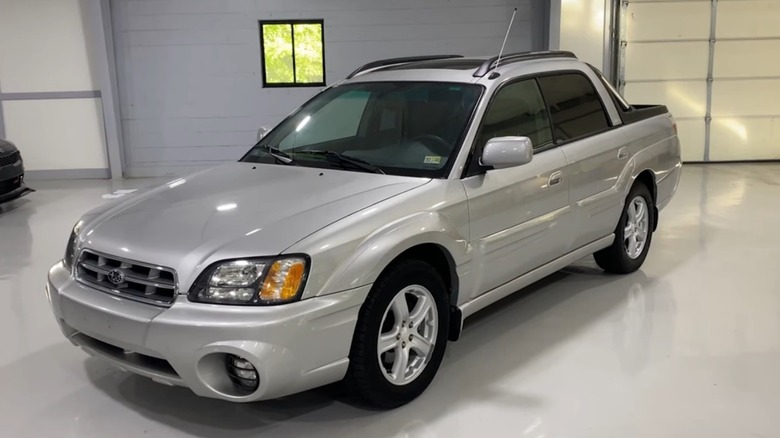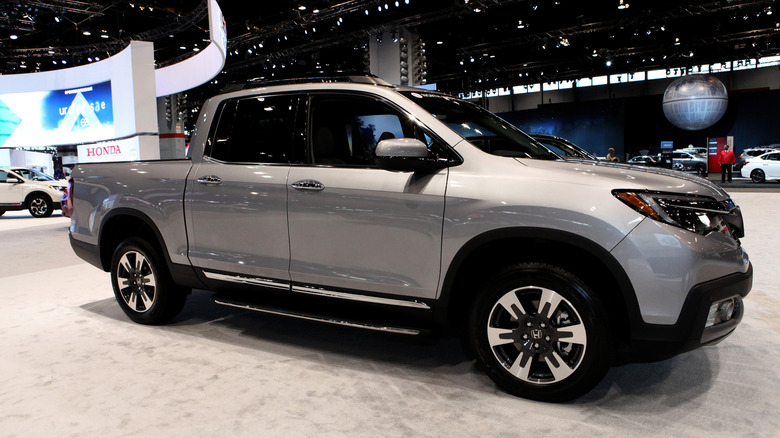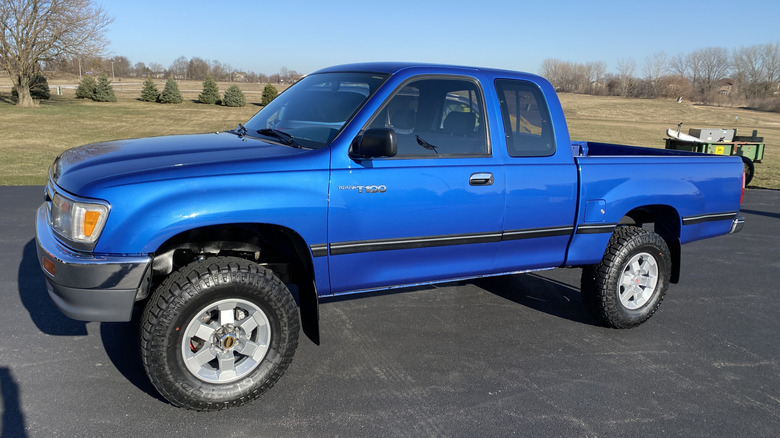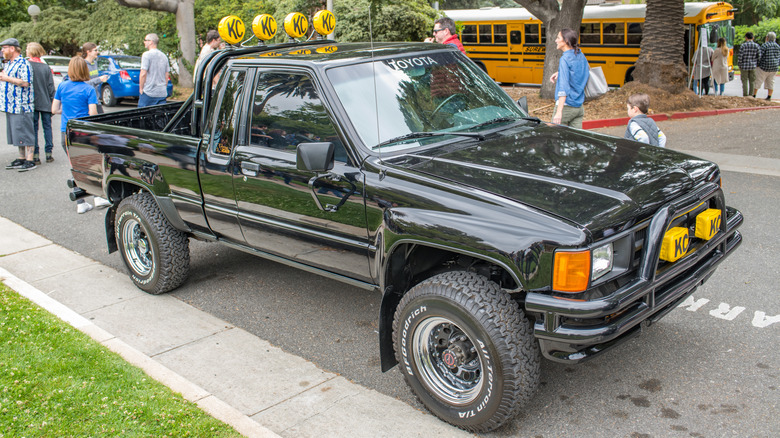The 15 Most Reliable Pickup Trucks Of All Time, Ranked
No matter where you drive in North America, you will see pickup trucks. They are used throughout the world. But nowhere else on the planet is the pickup truck so closely associated with culture and identity as in the United States. Pickups are incredibly useful for a plethora of tasks from moving supplies on the farm to picking up new living room furniture or hauling dirt bikes out to play. Modern trucks have advanced so significantly that interiors now rival luxury cars and the trucks themselves can be status symbols in certain social circles. It is not hard to bump into someone whose only vehicle has ever been a pickup.
Most trucks are used at some point to do some kind of work, whether it is to get supplies for a home improvement project or hauling around tools for contractor business. With the use of the truck often being crucial to completing a job on time, its reliability is of utmost importance. Manufacturers advertise their truck's dependability and durability to persuade buyers, as having a reliable pickup can literally make or break small businesses. Furthermore, expensive repairs can also kill the profitability of independent startups. Nobody wants to buy an unreliable vehicle, but with so many to choose from it can be a tough call. With a bit of research using official reviews and ratings as well as consumer feedback and a little subjective analysis, these 14 pickups stood out in order from least to most reliable.
15. Volkswagen Rabbit Pickup
While Volkswagen may be a German company, the creation of a small pickup based on the Rabbit/Golf platform was a purely American idea. According to Road and Track, VW bought a plant in Pennsylvania to build cars for the North American market, starting with the new Rabbit. The American VW crew got the idea to hack off the rear of the Golf and build a bed into it and sell it as a bare-bones truck. It sold from 1979 to 1984, often powered by a diesel engine cranking out an Earth-shattering 52 horsepower and a whole lot of black smoke.
While the little diesel engine did not break any speed records, it would excel in reliability and efficiency. Car and Driver's test of the diesel Rabbit in the 1977 issue found the reviewers achieving 39.5 mpg in an era when most American cars had thirsty V8 engines and abysmal performance. VW claimed at the time the diesel engine would last twice as long as its gas counterpart. An older Volkswagen will run a long time, but little things can go wrong, such as window cranks breaking off, though they won't be major and won't be terribly expensive.
14. Ford F-150
Ford began selling F-series trucks in 1948 and has since become the longest-selling pickup truck in America, as well as the best-selling in terms of total units sold. As of 2021, the F-series truck held its title of best-selling truck for 45 years and looks to retain that title into the future, according to CNBC. With that kind of history, you will find plenty of great models and many missteps. For Ford, the biggest misstep involving their F-150 happened with the 5.4L 3-valve Triton engine from about 2004-2007. A brief search online will uncover plenty of stories of expensive repairs for F-150 trucks with the 5.4 engine, but the best critique may be YouTuber Car Wizard's personal opinion of this engine, referring to it as, "The trashiest piece of crap motor I have ever seen."
While 5.4 F-150s are problematic, the 1993 Ford F-150 is considered by many to be the best F-150 ever made. While the styling is rather boxy and its interior is spartan compared to modern vehicles, it will not let you down. Cars.com consumer reviews gave it 4.7 stars and the comments remark on how it never fails them and suffers few problems. 4X4 Reports lists a few trouble spots from the heater and idling issues, but largely avoids significant trouble.
13. Chevrolet Silverado
Chevrolet introduce the Silverado as a full line of trucks in 1999. They have since been valuable tools and transportation for millions. Chevy trucks have been a staple of American roads since 1918 and, while never eclipsing Ford's sales numbers, come in at a close second. Chevy trucks have a reputation for being rugged and reliable, capable of getting the job done no matter what. Of course, nothing is perfect.
While the small block Chevy used in trucks until 2002 is renowned for its reliability due to its robust and simple design, some of the later engines suffer a bit more. However, based on data compiled from Consumer Reports, Motor Biscuit lists the 2012 Silverado as the most reliable of the last 20 years. It has a 315-horsepower 5.3L V8 backed up by a transmission with equally good marks. Only two recalls affected this model, both being minor. Despite this high point in the Silverado history, 2020 models' reliability ratings slipped substantially and reports show that the expected reliability of 2022 models has hit the floor, bringing the overall rank of the Silverado way down the list.
12. Toyota Tundra
After pumping out millions of tiny trucks the world over for decades, Toyota cracked the American full-size trucks market with the Tundra, its first large truck powered by a V8 engine manufactured in Indiana. Domestic manufacturing was key in keeping the price competitive as Japanese-built trucks would get charged a 25% import duty. The Tundra was a hit, although Toyota has never attained a large share of the truck market. Furthermore, buyers accustomed to Toyota's near-flawless reliability record have found a few surprises along the way.
While the Tundra displays the hallmarks of the quality construction of every Toyota, it lags in reliability. Motor Verso details the common problems including ABS failures and throttle control. 2012 models have troubles with air induction pumps. The biggest mark on the big 'Yota was the dreaded frame recall. According to ABC News, a frame design that allowed water to collect and rust through the frame meant that more than 100,000 Tundras were recalled and slated for a frame replacement. This huge issue is mostly what prevents this Toyota from resting on top of the scale. Still, the smaller Tacoma doesn't make the list at all due to frames of about 770,000 getting hit with the recall, a catastrophic disaster.
11. Mazda B2200
Mazda entered the American truck market in 1972 with the B1600 and later added its REPU, or Rotary Engine Pickup. Unfortunately, that truck performed poorly, mostly due to the rotary engine's lack of torque, terrible fuel economy, and high rate of failure (via Car Throttle). Mazda replaced it with piston power in a much better small truck, sold by Mazda until the early '90s when it was replaced by a badge-engineered Ford Ranger to avoid the 25% chicken tax. Coincidentally, in the late '70s, Ford badge-engineered a Mazda truck as the Ford Courier before developing their own Ranger small truck.
Gauging the reliability of a vehicle that has been out of production for nearly 30 years can be difficult. Many contemporary accounts of major problems aren't posted to the internet, so the only thing to go on are comments from owners of the last decade or so. Mazda has never been known to build shabby cars, and its trucks are no exception. Cars.com reviews are glowing, with an overall score of 3.9 out of 5. Users' comments note their particular truck has suffered no problems, with one having 600,000 miles on the original engine. Car Survey likewise shows commenters with nothing but its slow acceleration to complain about, except for one reviewer experiencing minor issues.
10. VW Type 2 Truck
The first Volkswagen vehicle produced after the war was the Type 1, colloquially known as the Beetle. The next vehicle was the Type 2, colloquially known as the VW Bus. This Type 2 was also available as a truck, imported into the US for a short time in the early '60s. Due to a trade war with Europe at the time, a tax, which came to be known as the Chicken Tax, was levied on imported trucks in the amount of 25%. This tax was aimed squarely at the Type 2 truck and effectively ended its importation immediately, per Investopedia.
Not much information is available about the truck specifically, but the reliability of the air-cooled VW engine is legendary. Being simple and dependable is largely responsible for VW's success as an exporter. Looking through threads on VWVortex, users comment that these cars are very reliable and the engines are robust, but as soon as you start skipping maintenance you will experience failures quickly. To put this in context, all cars of that time required regular adjustments and somewhat continuous maintenance. In the end, VW sold 23 million of its air-cooled Type 1 cars and a much smaller number of Type 2s with the truck being an even smaller fraction of that, and no company sells that many cars by making them unreliable.
9. Ford Ranger
Despite the incredibly high tariff of the Chicken Tax, small and lightweight Japanese trucks flourished in the American market in the '70s. Chevrolet and Ford even used their Japanese partners to rebadge trucks for sale at dealerships, the Ford Courier and Chevrolet LUV. Yet Ford saw a market it could better service – and better profit from –- with a domestic product, the Ranger. Ford debuted its first small truck in 1983, offering a choice of four engines including two 4-cylinders, a V6, and a Mazda-built diesel (via CNET).
The Ranger proved successful and sales were strong throughout its run, ending in 2011. A new Ranger came back in 2019 but is a much larger truck that shares only the name with the original. While scores of owners swear by their little workhorses for their rugged dependability, a few issues have popped up along the way. Motor Biscuit lists more than 1000 complaints of a $3,500 engine gauge repair for 1999 models and a low owner satisfaction score from Consumer Reports for the 2001 model. However, Motor and Wheels reports that 2010 and 2011 models score on the top end for reliability and satisfaction from Cars.com and US News, and also reports the general consensus that the best Ranger ever built is the 1986 model. Comments from Car Survey support this notion with unanimous consent among reviewers.
8. Nissan Hardbody
Datsun's evolution into selling cars under the Nissan marque culminated in the mid-'80s. With this change came Nissan's first American manufacturing plant and the first car to roll out of it was the Nissan D21. Its unofficial designation was Hardbody, but that didn't stop Nissan from using this moniker in its marketing materials. Hardbody is meant to signify its double-walled bed, aggressive styling (not by today's standards), and firm paneling. It was to be the last Japanese mini truck sticking to the formula of a tough, basic, and capable small truck as it would be followed by the Frontier in 1998 (via Motor Trend).
The Hardbody was built while trucks were still simple and basic, yet it benefitted from modern engines with fuel injection, electronic ignition, and computerized design. This made for a tough and reliable little truck. Emphasis on its ruggedness shows in the dozens of reviews on Car Survey. In the first 10 pages of the 1995 model, only one reviewer had mostly negative comments, focusing almost entirely on rust issues. Others mentioned rust to be a problem, but not so much as to ruin the ownership experience. The best quote is that the Hardbody is "annoyingly dependable."
7. Dodge Ram 50
Like the other Detroit automakers, Chrysler had a partnership with a Japanese manufacturer, Mitsubishi. When Chrysler introduced the Dodge D50 (later renamed Ram 50) and sibling Plymouth Arrow, it had already been selling Mitsubishi vehicles affixed with the Pentastar on the Dodge Colt and Dodge Challenger. The little Dodge showed up at dealers in 1979, equipped with a choice of 2.0L or 2.6L four-cylinder engines. Both engines produced more than 100 horsepower, which exceeded the competition by around 20 horsepower while being offered at a lower price point, per The Fast Lane Truck.
Chrysler eventually ended the rebadging of Mitsubishi trucks after introducing the uniquely mid-sized Dakota. Plenty were sold throughout the '80s, but information specifically about their reliability is scarce. Reviews on Car Survey and KBB suggest the Japanese Dodge shares similar traits as the other small trucks of the period, including rock-solid reliability. Among the almost unanimously positive reviews are complaints about rust. Mechanical problems appear to be minimal and some of these trucks are still on the road with more than 200,000 miles.
6. Chevrolet LUV
Chevrolet had a long-established relationship with Isuzu of Japan and relied upon it to fulfill demand for light and affordable pickups in the US. Starting with the 1972 model year, Chevy customers could be greeted by a small but tough little truck called LUV (Light Utility Vehicle). It came equipped with a 1.8L engine producing 75 horsepower and was a no-frills little truck. Four-wheel-drive would be offered in 1979 and a second generation with redesigned styling arrived in 1980. With the second generation came an optional diesel engine. Chevrolet imported the LUV from 1972 to 1982, selling half a million units before dropping in favor of the domestically produced S10 (via TFLTruck).
Chevy LUV was also imported and sold directly by Isuzu as the P'up toward the end of the LUV run and continued after Chevy dropped it. Isuzu had been making heavy trucks and diesel since the early 20th century and its engines are known for being robust powerplants. One 4x4wire says the 58 horsepower 2.2L diesel is one of the best-made in that era and that the 4-speed transmission is extremely stout. It is impressive that all these years later, an entire internet forum dedicated to the Isuzu P'up exists. Isuzu must have done something right to garner all these fans decades later.
5. Datsun 620
Datsun first exported cars to the US in 1958. Its micro-sized cars took some time to catch on, but by the late '60s, the super sporty 240Z and the cute and nimble 1600 roadster attracted new buyers to the brand. Datsun had also been selling small trucks along with its cars and, while they were often viewed as mere curiosities, sales of the tiny trucks continued to grow. In 1972, the new Datsun 620 truck debuted, selling through the '70s until 1979 (via Road and Track).
The diminutive Datsun trucks established the Japanese market for trucks as each maker would eventually sell a small truck that was surprisingly tough, capable, and dependable. Original condition and customized 620 pickups are desirable for collectors, with sales on Bring A Trailer reaching $10,000. Looking through reviews for any year 620 reveals positive comments all around. Car Survey and Car Gurus feature many submissions with the top comments praising it for being reliable and easy to work on, hallmarks of the Japanese mini-truck.
4. Subaru Baja
The short-lived successor to Subaru's quirky and fun BRAT minitruck only lasted four model years but left a lasting impression. The Subaru Baja was first released for the 2003 model year and 2006 was the last. Like the BRAT, it was based on one of Subaru's regular car models, with the rear portion sort of hacked off to make it a truck — or a ute, as they are called in Australia.
The Baja is based on the Subaru Legacy and looks nearly indistinguishable from the front. However, when you walk around the back, you find a short truck bed available for light hauling only. At just 42 inches long, cargo capacity is in short supply, but it can be increased by a clever pass-through with the rear seats folded down and a tubular bed extender installed with the gate open. Power comes from a traditional Subaru boxer 4-cylinder engine with 2.5-liter displacement and a turbo model was also offered.
The Baja was a quirky combination vehicle that many people love today. It was built in the U.S. for a domestic market but did not sell well and can be hard to find today. However, if you do find one, they are generally dependable vehicles, and owner reviews online lavish them with praise. They are subject to the Takata airbag recall and rust is a particular problem to look out for. Otherwise, even though they are aging, a Baja should still be a solid buy.
3. Honda Ridgeline
Honda's first entry into the truck market came rather late. In 2006, the Ridgeline debuted as a uniquely Honda creation. Instead of building a large V8-engined body-on-frame full-size truck, Honda's Ridgeline was slightly smaller and built with unibody construction, like a car. Honda's reputation for building reliable vehicles also helped to sell the new truck.
Adding a truck to its lineup has not yet tarnished Honda's reputation as the Ridgeline has proved to be dependable. It has a few trouble spots, but nothing so egregious as engine failures or frames rusting out. Car and Driver's 2019 2019 long-term test model at 40,000 miles saw a few service appointments costing around $500 for brake rotors, but few other issues. It also found the truck to be tough and capable and called out the naysayers proclaiming that it is not a real truck. Edmunds user reviews list dozens of comments from the entire run of the Ridgeline with a few single-star reviews and an abundance of top-rated ones. A recall of hood hinges affected a large number of them in 2017. CoPilot warns of a few troublesome year models and a particular problem with number four cylinders going bad on 2006 models with high miles.
2. Toyota T100
In the early '90s, Toyota decided to step up its truck game by going upsized with the T100. It has been seen as Toyota's first full-size truck, however, it is really a mid-size, much like the Dakota. The T100 debuted in 1993, offering only one engine, a 3.0L V6 producing just 150 horsepower. This may have been adequate for most of what people needed to do with this truck, but it could not compete with the much large V8 trucks on the market at the time. The T100 is still a capable truck with all the qualities that make up a Toyota, despite being produced by its truck-building subsidiary Hino. While some improvements were made to the truck over the years, it would eventually be replaced by the Tundra (via AutoTrader).
Despite being made in a Hino factory, the T100 shares the reliability of other Toyota models. Comments from owners posted to Repair Pal have at least one common thread, high mileage. Scores of owners claim their T100 has traveled 300 to 400,000 miles with few hiccups aside from regular maintenance and a few broken parts along the way. Furthermore, Edmunds professional review lists Toyota reliability as a pro and the 1998 model boasts 19 user reviews all with a five-star rating.
1. Toyota Pickup (aka Hilux)
The undisputed champ of reliable and literally indestructible trucks is the Toyota Pickup, or Hilux outside of North America. The Pickup range of trucks model line stretches back to the '60s when Toyota and other companies from Japan started exporting their pint-sized pickups around the world. The Pickup gained popularity in the US as a small and tough little workhorse, even becoming somewhat of a status symbol thanks to Marty McFly. The first truck Toyota imported was the Stout in 1964. It was followed up in 1968 by the cleverly-named Pickup. These and successive models cemented its reputation as the most reliable truck in the world.
One of Top Gear's most legendary challenges involves the attempted destruction of a diesel Hilux. Despite driving it into a tree, letting it get washed out by high tide, dropping a travel trailer on it, bashing it with a wrecking ball, being burned alive, and placing it atop a building during its demolition, it still started and, amazingly, moved under its own power. More recently, YouTuber Whistlin Diesel attempted his own torture test to kill a Hilux, also with no success. No doubt a look through official tests, guides, and reviews will confirm its reliability. Simply put, the Toyota truck is invincible.
